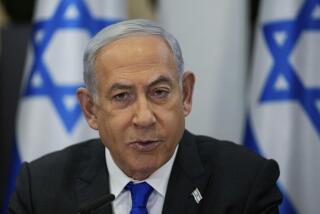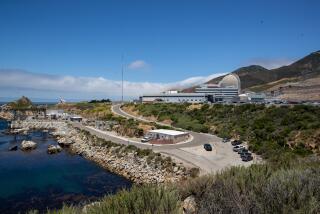Taiwan Court Tiptoes Around Nuclear Debate
- Share via
BEIJING — Taiwan’s highest court, gingerly stepping through a political minefield, ruled Monday that the government’s decision to scrap a controversial nuclear power project was flawed but not outright unconstitutional.
The careful ruling capped months of bickering during which the island’s powerful political opposition, the Nationalist Party, sought to use the issue to topple the novice government of President Chen Shui-bian.
The Nationalists had argued that Chen’s prime minister--Taiwan’s No. 3 political official--overstepped his bounds in canceling the $5-billion project without the approval of the legislature, which the Nationalists dominate.
Taiwan’s Grand Council of Justices appeared to accept that contention but avoided a constitutional crisis by sending the issue back to Prime Minister Chang Chun-hsiung. The 15-judge panel said Chang must now consult the legislature over the fate of the nuclear plant, on which construction is already one-third complete.
The decision to shelve the project infuriated the Nationalists, who approved the plant in 1980 during the party’s 50-year-plus hold on political power. Bitter over their loss of the presidency last year to Chen, a member of the Democratic Progressive Party, the Nationalists initiated a now-stalled attempt to recall him over the issue.
“We hope that [the judges’] decision will calm the people and stabilize the political situation,” Deputy Prime Minister Lai In-jaw told reporters.
The ruling gives the legislature room to take a vote of no confidence in the government if it wants. But that would be a tough political choice for the Nationalists because the parliament would probably then be dissolved and snap elections held. And their party--languishing in opinion polls--would very likely fare badly.
Currently, legislative elections are not due to be held until year’s end.
“We should seek a resolution to help bring political stability,” said Wang Jin-pyng, the speaker of parliament and a high-ranking Nationalist Party official.
The confrontation over the power plant presented Chen with the most serious of several crises to hit his administration since it took office in May--Taiwan’s first democratic transfer of power.
Scrapping the plant allowed Chen to fulfill one of his campaign pledges. His party had long opposed the project, which would be Taiwan’s fourth nuclear power plant, as unnecessary and environmentally unsound.
The Nationalists struck back by saying that reneging on the plan would cost the government billions of dollars in compensation to the companies involved in the project and seriously damage investor confidence. Taiwan’s stock market plunged amid the controversy, fueling economic anxieties already rippling across the island.
The furor helped lead to the resignation of Chen’s first prime minister, Tang Fei, a Nationalist stalwart who clashed with Chen over the fate of the power plant. Tang’s successor, Chang, ultimately decided to go ahead with plans to scrap the project.
Taiwan’s 23 million inhabitants had been waiting for weeks for the high court to rule on the government’s actions. Polls show that many Taiwanese blame both major parties for ineptitude in running the island.
More to Read
Sign up for Essential California
The most important California stories and recommendations in your inbox every morning.
You may occasionally receive promotional content from the Los Angeles Times.














